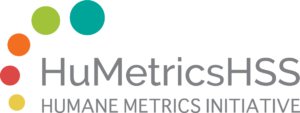Our team of evaluators from Northwestern University (Galter Health Sciences Library and Learning Center and the Northwestern University Clinical and Translational Sciences Institute) had the opportunity to participate in the first cohort of the Values-Enacted Leadership Institute (VELI) facilitated by the HuMetricsHSS team, hosted at the University of Oregon, Portland.
It is a rare privilege to have an opportunity to collaborate in person over multiple days with multidisciplinary teams from all over the country — all of us seeking to improve our own leadership styles, strategic decision-making, and scholarly production and assessment practices. In appreciation for the work done together with our facilitating team and our fellow attendees, we want to share the most immediately impactful takeaways for our team over the course of this terrific experience.
As Evaluators, we are wired to think consistently, systematically, and frequently about process improvement, replicability, and adaptability of workflows and processes. These five takeaways below are meant to be, in a way, a mental template for us (evaluators love templates!) to imbue values in our professional activities, especially to leadership and strategic management.
1. Define your team’s values: collaboratively and explicitly. Start here, regardless of how long you have been working together as a team. This was, perhaps, the single most surprising lesson for our team. Since we have a long history of working together, we had already engaged in many conversations about our values prior to the Institute. However, we had not sat down to actually put them onto paper, individually first and then together as a group to identify those values that define us collectively. It was invigorating to confirm the natural convergence that our shared history was bound to create. Until VELI, we had not put this to the test (and we are so happy we passed). VELI provided a special opportunity to listen closely to one another and discuss similarities and differences in how we defined and sought to practice specific values. From this experience, we learned the importance of testing and re-testing well established assumptions. To be values-enacted leaders also means to know ourselves and our team well. The exercise of identifying, sorting, and prioritizing the values that define us as a group was the perfect foundation for VELI and served as a conduit to meaningful and productive work at the Institute.
2. Keep your “North Star” central and use it for navigation and alignment. Once your values as a team have been established or refined (i.e., How do you work together? What expertise do you bring to this work individually and collectively?), it’s the right time to identify how your team values align with the mission and vision of the larger context in which your team exists (whether a program, university, etc.). The organizational values will likely be your team’s “North Star,” and they should be directly connected to and reflected in your own team’s values. This alignment must run across the gamut of activities, initiatives, and projects that you and your team engage in. It sounds daunting, but it needn’t be. If you keep pointing to the “North Star,” it does not matter where you are or what weather (e.g., obstacles, challenges, external factors, etc.) you are experiencing; you can always use your “North Star” to keep your team moving in the right direction.
3. Practice intentional leadership and management. Openly and continuously reassess how your team’s practices match your values (or don’t). Identify “re-evaluation trigger points” but also plan for routine check-ins and embed them into your workflows and standard operating procedures. Leverage significant changes in your workflows (scope, frameworks, staffing, etc.) as an opportunity to return to your “North Star” and verify alignment. Do not hesitate to stop and reconsider fixes for misalignments – doing so is a strength, not a weakness.
4. Learn from expert leaders and from fresh eyes. There is no need to reinvent the wheel at every turn. Identify leaders and managers who bring different perspectives and who clearly articulate “North Star” alignment. They become champions for values-enacted, responsible practices, and can model behaviors we want to encourage on our team such as learning from their mistakes and holding themselves accountable. At VELI 2025, we were fortunate to learn from such leaders, engage with them about their ideas and approaches, and find ways to integrate their advice into our own work. Throughout the Institute, the VELI team reinforced the importance of learning from people with different life paths, informed by disparate areas of work, disciplines, or lived experience. This allowed the VELI team to see their own work from different vantage points, understand it better, and build on these perspectives to ensure that VELI was an outstanding learning experience for all participants.
5. Take wellness and team building seriously. Unlike most traditional workshops and trainings that start gradually and build up, VELI surprised and excited us by jumping into the “challenging” work immediately. Interestingly, we always were only pushed to do so after having the opportunity to start our day together by engaging in a “reflective mindset” centered on our individual and group realities. Another thoughtful and successful Institute activity was the “Walk-in conversations” with other participants and/or facilitators. The opportunity to walk and engage allowed movement to be a spark for inspiration. Because this is not the “traditional” way of holding strategic management workshops, the walk and engage meetings were eye-opening and idea-generating in many ways. Undoubtedly, this is a logistical improvement that we will keep in mind internally for future meeting planning. Ultimately, the most important advice to remember is that leadership and strategic management thrive on solid interpersonal connections. It is critical to make time to connect as colleagues and peers.
Our team is grateful for the opportunity to participate in the inaugural VELI, and we look forward to applying these lessons learned to our daily work. We are also excited to pay this forward by supporting and encouraging future VELI participants.
